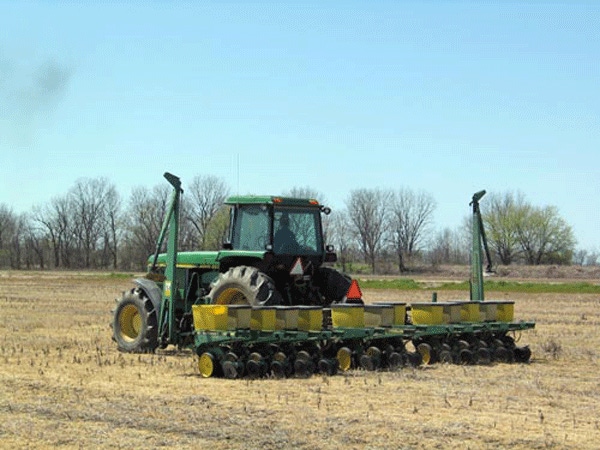March 8, 2011

Confused about seed treatments? Who can blame you?
Scott Stewart, University of Tennessee Extension integrated pest management specialist, says there are many options that differ by crop and seed companies. Stewart also says there are options for “downstream” treatments for some, but not all, situations. “Furthermore, pricing is not very transparent,” he cautions.
Stewart breaks down seed treatments by crop and by the three pest groups that seed treatments target: seedling fungal diseases, insects and nematodes.
Here are his explanations:
Corn: Unless you special order your seed differently, almost all corn seed will come standard with a base fungicide and insecticide seed treatment. An at-planting insecticide treatment (e.g., seed treatment) is generally recommended in Tennessee. Poncho 250 (e.g., clothianidin, DeKalb) and Cruiser 250 (e.g., thiamethoxam, Pioneer) are the standard treatments being marketed by seed companies. Both are pretty good broad-spectrum choices, but neither are foolproof.
Neither provides substantial protection against cutworms. Cruiser 250 (or the 500 rate available by request) will not do much for sugarcane beetles. Poncho is better, especially at the 500 rate. However, Pioneer does have a Poncho 1250 rate available upon request in lieu of Cruiser.
For whatever reason, when you order the 500 rate of Poncho or Cruiser from DeKalb or Pioneer, respectively, a nematicide is included. The nematicide is either Votivo (a biological nematicide, DeKalb) or Avicta (abamectin, Pioneer). The value of a nematicide seed treatment for corn appears to be quite limited in Tennessee.
Acceleron? This is an umbrella name for any one of several seed treatment packages marketed by Monsanto. The Acceleron terminology is used in corn, soybeans and cotton (e.g., DeKalb, Asgrow, Delta Pine), but the actual components of the seed treatments can vary considerably across crops. In corn, the standard Acceleron treatment includes a base fungicide and insecticide seed treatment (Poncho 250). P.s., 250 is 0.25 gm active ingredient per 100 kg seed.
Soybeans: Soybean seed can be purchased untreated, with a base fungicide seed treatment, with fungicide + insecticide, or with fungicide, insecticide and a nematicide. Downstream treatments can typically be made by your local distributor. Fungicide or fungicide plus insecticide seed treatments are often recommended in Tennessee, especially in early planted soybeans. The standard base fungicide treatments offered by seed companies are pretty robust.
Most common insecticide treatments
The most common insecticide treatments are imidacloprid (1.6 oz/100 wt of imidacloprid 600/5F) or thiamethoxam (Cruiser 5F at 1.28 oz/100 wt seed). Both are good treatments but, at the above rates, Cruiser will be more consistent (but probably more costly). Imidacloprid at 2.0-2.4 oz would be more comparable in terms of efficacy to the Cruiser treatment.
These higher rates of imidacloprid would have to be applied by your local distributor.
Another insecticide option is NipsIt (clothianidin) that is being packaged with fungicides as Inovate (from Valent). We have less data on this product but it appears comparable to the other options. Nematicides should not have much value in the absence of significant nematode infestations. So sample your fields for nematodes!
Acceleron? You can order soybean seed from Monsanto with Acceleron or Acceleron I. Acceleron just includes fungicide components, Acceleron I includes fungicide and insecticide (imidacloprid at the 1.6 oz rate).
Cotton: Cotton will almost always come with a base fungicide seed treatment. Additional fungicide, insecticide or nematicide seed treatments can be purchased from the seed company or applied downstream. An insecticide seed treatment is strongly recommended in Tennessee unless you are using some other treatment such as Temik or Acephate as an in-furrow spray or seed treatment.
The two options being marketed are imidacloprid (formerly called Gaucho) and thiamethoxam (Cruiser). The standard rates are imidacloprid at 0.375 mg ai/seed or thiamethoxam at 0.34 mg ai/seed. We have lots of data in Tennessee showing these products provide similar crop protection at these rates.
Acceleron? You can order cotton seed from Monsanto with either a base fungicide treatment, Acceleron I, or Acceleron N. Acceleron I includes fungicide and insecticide components (imidacloprid at the standard rate), Acceleron N includes fungicides, insecticide plus a nematicide (abamectin/Avicta).
Still confused? Feel free to contact Stewart at 731-425-4709, or by e-mail, [email protected]. You can also visit http://www.UTcrops.com or contact your local county UT Extension agent for more details.
Additional information may also be available online at the national eXtension website. eXtension delivers knowledge from land-grant university experts across America, including the University of Tennessee. Visit http://www.eXtension.org.
You May Also Like




